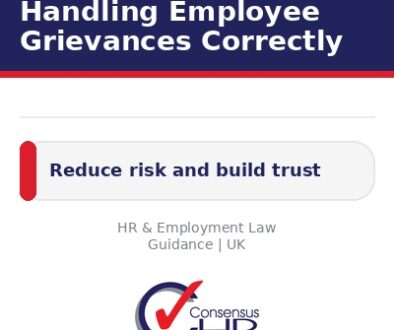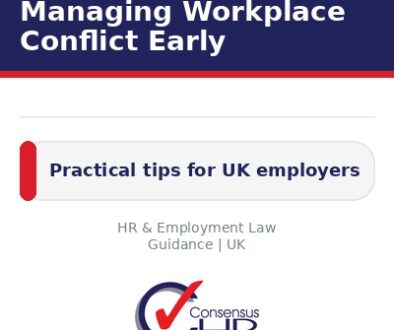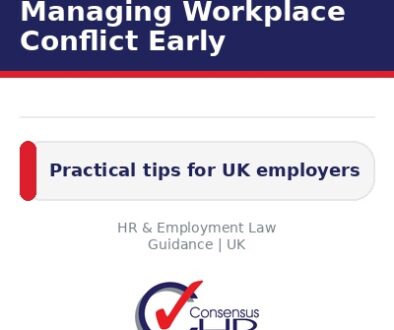NMC V Somerville – Worker Status

Employment Law - Worker Status NMC V Somerville - were they entitled to paid holiday?
HR Inform part of our Chartered Institute recently wrote another article on Worker Status and a recent case which included a judgement by the Employment Tribunal appeal on whether the worker status of the person was that of ‘Employee’ and hence entitled to paid annual leave.
This is a subject that we at Consensus HR continually have discussions with our current and prospective clients as the implications of using the incorrect status can have serious legal and expensive financial outcomes if the incorrect status used.
This article by HR Inform gives full details and notes for employers
SUMMARY
This Court of Appeal (CoA) decision involved worker status and whether or not a commitment to offer or accept a minimum amount of work was crucial to worker status for the purposes of claiming holiday pay.
LAW
Working Time Regulations 1998
Regulation 2(1) of the Regulations defines a worker in the following way:
“”Worker” means an individual who has entered into or works under (or, where the employment has ceased, worked under) –
(a) a contract of employment; or
(b) any other contract, whether express or implied and (if it is express) whether oral or in writing, whereby the individual undertakes to do or perform personally any work or services for another party to the contract whose status is not by virtue of the contract that of a client or customer of any profession or business undertaking carried on by the individual;
and any reference to a worker’s contract shall be construed accordingly.”
FACTS
The claimant acted as a panel member, and chair, of the Fitness to Practise Committee of the Nursing and Midwifery Council’s (NMC’s) regulatory body. The amount of hearings he undertook varied from between 17 to 129 in the 8 years that the claimant did this work.
In the claimants’ terms and conditions, he was described as an independent contractor and was required to adhere to a code of conduct. The NMC did not have to offer hearings (or work) and there was no obligation on the claimant to accept that which was offered. The claimant was also able to withdraw from a hearing even after one was allocated, without reason or penalty.
A claim was brought for unpaid holiday, but in order to make a ruling on this the employment tribunal (ET) had to first establish the claimant’s employment status.
EMPLOYMENT TRIBUNAL (ET)
The ET had to consider both the overarching agreement, and the individual contracts that made it up, agreed ever time an assignment was accepted. They rejected the idea that either could be contracts of employment, due to the right to withdraw services under them and therefore lack of “mutuality of obligation”.
To determine worker status, the ET identified three principles to be applied.
- The two parties must have entered a contract together.
- The work under the contract must be performed personally.
- One party cannot be a client/customer of a profession or business carried on by the claimant.
Focusing on the third, as the first two were clearly evident, the ET could not find that the NMW was a client or customer, as there was such a high degree of control, integration and subordination between the parties, including in pay negotiations, that worker status was established. The fact that there was no mutuality of obligation did not prevent this finding.
EMPLOYMENT APPEAL TRIBUNAL (EAT)
The NMC appealed on the basis of mutuality of obligation, but this was dismissed because it was not a prerequisite for worker status to have an irreducible minimum of obligation to accept and perform a minimum amount of work for the other party who was obliged to offer or pay for that work.
The NMC again appealed, again on this point.
COURT OF APPEAL (COA)
The ET’s three principles of worker status were confirmed. It was held by the CoA that the overarching contract between the claimant and the NMC included mutually enforceable obligations, but these were not necessarily the type that meant there was a worker contract, nor did it amount to a contract to do or perform services personally, it simply laid out the obligations that would be in place if a separate agreement to do or perform services personally was made.
However, when an assignment was offered and accepted, an individual worker agreement did arise, as the performance was personal, and the NMC was neither a customer nor a client. It did not matter that there was no future obligation to offer or accept work, nor that the claimant could withdraw from the agreement if they so chose.
Notes for employers
This case appears to settle the debate as to whether or not “mutuality of obligation” crucial to worker status where the individual is performing ad hoc work; it is not. Neither is the right to cancel or withdraw the work a barrier to this status.
As such, we are left with the following key questions to be asked when considering is someone is a self-employed independent contractor and not a worker.
- Is the organisation a client or a customer of theirs? If not, worker status is likely. Consider:
- Are they integrated into the business?
- Is the organisation in control and the individual subordinate?
- Can pay be negotiated or rates set by the individual and not the organisation?
- What level of financial risk is there for the individual?
If the answer to these is yes, worker status is likely.
- Are they personally required to do the work? Is the right of substitution genuine? Genuine substitution is likely to indicate self-employed status.




